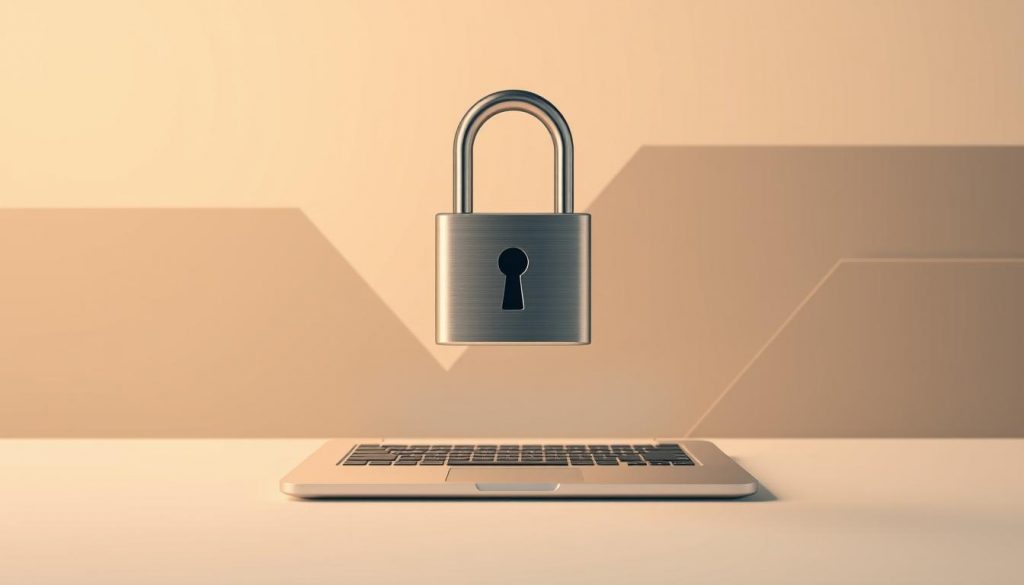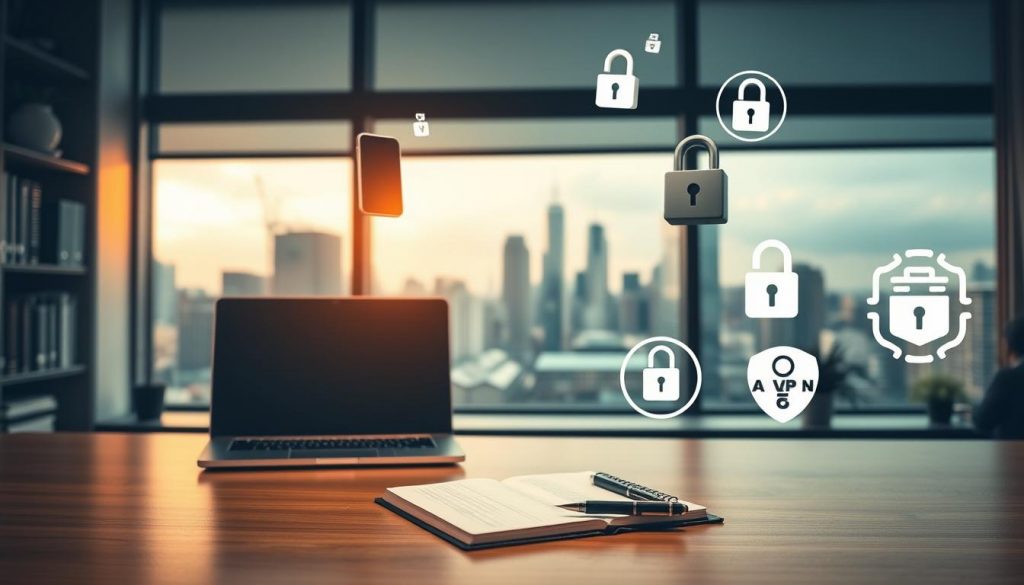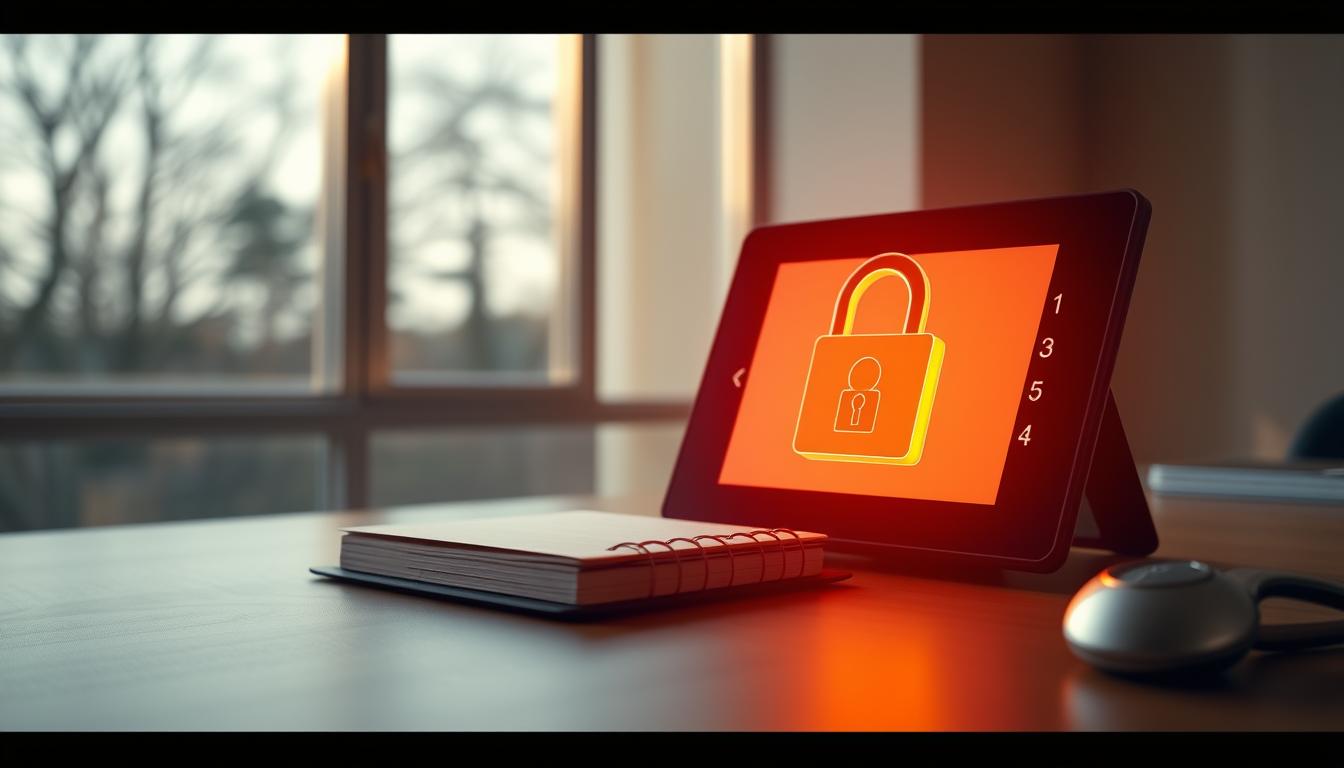As a teenager, closing my diary made me feel vulnerable. I worried if someone would read my deepest thoughts. Today, the digital world has made these concerns even bigger, highlighting the need for digital privacy in journaling.
Journaling is a personal journey of self-discovery. It’s not just about keeping secrets. It’s about having a safe space for real emotional exploration. Studies show that 70% of people in personal development workshops value a secure journaling environment to avoid self-censorship.
Your journal is a place for unfiltered thoughts. Whether it’s a traditional notebook or a digital platform, keeping it private is key. Many people prefer digital journaling, looking for password-protected options to protect their most personal entries.
In this guide, we’ll cover ways to keep your journal safe. We’ll look at both physical and digital security methods. You’ll learn how to make your journal a secure place for your most vulnerable writings. We’ll share practical tips to keep your private writing safe.
Privacy is not just a choice—it’s a basic right to protect your emotional space. By using strong security measures, you can make your journal a confidential space. Here, your thoughts can flow freely without fear of being seen.
Understanding the Importance of Journal Privacy
Your journal is more than just words. It’s a personal space for your thoughts, feelings, and experiences. Keeping your journal private is key to its true value and healing power.
Why Keeping a Journal is Personal
Journaling is a private way to reflect and process emotions. Studies show its deep impact:
- 65% of journal keepers use it for personal growth
- 80% find it helps with stress
- It can boost emotional intelligence by up to 50%
The Risks of Sharing Your Thoughts
Sharing your journal can risk your emotional safety and personal space. Keeping your journal secure is essential:
| Risk Category | Potential Impact |
|---|---|
| Personal Relationships | Breach of trust, emotional vulnerability |
| Professional Reputation | Potential misinterpretation of private thoughts |
| Mental Well-being | Increased anxiety, self-censorship |
Consequences of Losing Privacy
When your journal’s privacy is lost, you might start editing your true thoughts. This self-censorship hinders the journal’s purpose—true self-discovery and healing.
“If you’re holding back the truth in your journal, you’re denying yourself the chance for authentic growth.”
Physical Security for Your Journal
Keeping your journal safe is important. It’s not just about hiding it. With the right steps, your private thoughts stay private and safe.
A survey found that 72% of diary keepers hide their journals. Here are some ways to keep your journal safe.
Best Storage Practices
- Choose a location away from common living spaces
- Use dedicated storage spaces like locked drawers
- Consider using a small personal safe
- Avoid leaving journals in plain sight
Lockable Storage Solutions
Secure storage is key to keeping your journal safe. A basic lockbox costs about $25. It’s a small price for your privacy.
“Your journal is a sacred space for personal reflection. Protect it like the treasure it is.”
Traveling with Your Journal
- Always keep your journal in a secure, private compartment
- Use a bag with zipper closures
- Consider a small portable lock for your journal
- Never leave your journal unattended in public spaces
Pro tip: About 65% of individuals use creative codes or hidden writing techniques to add an extra layer of protection to their personal writings.
Physical journal safety is about being proactive. Think carefully about where and how you store your most personal thoughts.
Digital Journal Security Basics
Keeping your digital diary safe is very important. It’s where you store your memories, feelings, and private thoughts. You want to keep it away from unwanted eyes.
Choosing the right app for your diary is key. Not all apps are good at keeping your thoughts safe.
Choosing Secure Apps and Platforms
Look for these security features in digital journal apps:
- Passcode protection
- Biometric authentication
- End-to-end encryption
“Your digital journal should be as private as a locked physical diary” – Digital Privacy Expert
Importance of Regular Software Updates
Updating your journal app is not optional. Updates fix security holes and keep your diary safe from hackers. Turn on auto-updates for ongoing protection.
Your digital journal is more than an app. It’s a safe for your most precious memories and thoughts.
Password Protection for Digital Journals

Your digital journal holds your deepest thoughts and memories. It’s vital to protect this space with strong passwords and privacy measures. This way, your most private thoughts stay safe from unwanted eyes.
Crafting Unbreakable Passwords
Making a strong password is key to keeping your digital journal safe. Here are some tips:
- Use a mix of uppercase and lowercase letters
- Include numbers and special characters
- Create passwords longer than 12 characters
- Avoid personal information like birthdays or names
“A strong password is like an invisible shield protecting your most personal thoughts.”
Leveraging Two-Factor Authentication
Two-factor authentication adds an extra layer of security. It requires a second step, like a code sent to your phone, to get into your journal.
| Authentication Method | Security Level |
|---|---|
| Password Only | Low |
| Password + Mobile Code | High |
| Password + Biometric | Very High |
Most apps offer top-notch security. They make keeping your journal safe easier than ever. Remember, your journal’s safety is an investment in your peace of mind.
Encryption Options for Your Digital Journal
Keeping your digital journal safe is key. With more of our lives online, our thoughts can be at risk. It’s vital to protect them.
What is Encryption and Why Use It?
Encryption turns your journal into secret code. Only with the right key can you read it. It’s like a digital safe for your thoughts.
With online privacy concerns high, encryption is a must. It keeps your journal safe from prying eyes.
Popular Encryption Tools for Journal Apps
Choosing the right encryption tool is important. Here are some top picks:
- VeraCrypt: Works on Windows, macOS, and Linux
- Standard Notes: Encrypts entries offline first
- The Journey App: Used by 2 million for secure journaling
“Your journal is a sanctuary of personal thoughts – encryption is its guardian.”
Digital journal encryption has big benefits:
| Encryption Feature | Security Benefit |
|---|---|
| End-to-End Encryption | Prevents data interception |
| Offline Encryption | Protects data before cloud upload |
| Multi-Device Support | Maintains security across platforms |
For 61% of journal users, privacy is top priority. Encryption is essential. Pick a method that fits your needs and skills.
Pro Tip: Always use strong, unique passwords and enable two-factor authentication for maximum journal security.
Managing Access to Your Journal
Keeping your digital privacy safe is key, even when sharing devices. Your journal holds your deepest thoughts and stories. It’s not just about tech—it’s about setting boundaries that honor your space.

Keeping your journal private can be tough, like in shared spaces. It’s not just about passwords. It’s about making a plan to keep your writings safe.
User Permissions on Shared Devices
Here are some steps to protect your journal on shared devices:
- Create a separate user account with restricted access
- Use strong, unique passwords for your journal app
- Enable two-factor authentication when possible
- Log out after each journaling session
Maintaining Separate Spaces
Both physical and digital journaling areas need careful handling. Here are some tips:
- Choose a private spot for your journal
- Use encrypted digital storage
- Talk about your privacy with others
- Keep physical journals in safe places
“Your journal is a sacred space—protect it with intention and care.”
Digital Privacy is about creating personal sanctuaries that remain inviolate, regardless of shared living or working environments.
Maintaining Anonymity in Online Journals
Digital journaling safety is all about keeping your online identity safe. You need to create layers of anonymity to keep your thoughts private.
There are many ways to keep your privacy when using online journaling platforms:
- Create unique pseudonyms that aren’t linked to your real identity
- Use generic avatars without personal photographs
- Avoid sharing specific personal details that could identify you
Leveraging Pseudonyms for Protection
Pseudonyms are like a digital shield in online writing communities. Choose a name that feels comfortable but doesn’t reveal personal information. Your pseudonym should be the same everywhere to build a reliable anonymous persona.
VPNs: Your Digital Privacy Cloak
Virtual Private Networks (VPNs) are key for digital journaling safety. They encrypt your internet connection, making your online activities invisible to trackers.
| VPN Feature | Privacy Benefit |
|---|---|
| IP Address Masking | Hides your real location |
| Encryption | Secures internet traffic |
| Server Routing | Prevents direct tracking |
“Privacy is not something that I’m merely entitled to, it’s an absolute prerequisite.” – Marlon Brando
By using these techniques, you can build a strong system of private writing. This protects your digital journal from unauthorized access.
Dealing with Unwanted Access
Keeping your journal private is very important. This is true when you might face security risks. Your journal’s safety is key when it has sensitive info.
Spotting unauthorized access needs careful watching. Your personal writings need strong protection against unexpected breaches.
Recognizing Signs of Unauthorized Journal Access
- Unexplained changes in journal content
- Suspicious device login attempts
- Unusual emotional reactions from people around you
- Digital traces of recent access
Critical Steps After a Security Breach
- Immediately change all passwords
- Review recent journal entries
- Check device access logs
- Consider legal implications if necessary
“Your journal is a sanctuary of personal thoughts – protect it fiercely.”
Legal issues can be complex when your journal privacy is broken. If you think there’s serious unauthorized access, talk to a privacy expert.
| Action | Recommended Response |
|---|---|
| Digital Breach | Change passwords, enable two-factor authentication |
| Physical Journal Compromise | Relocate or secure in locked storage |
| Potential Legal Violation | Document evidence, seek professional advice |
Remember, your privacy and safety are the most important. Act quickly and wisely to keep your personal journal safe.
Best Practices for Enhancing Journal Privacy
Keeping your journal private is key. It’s a place for your deepest thoughts and feelings. To protect it, use both digital and physical methods. This way, your journal stays safe from unwanted eyes.
Start with digital security. Choose apps that use end-to-end encryption. They should also have two-factor authentication and update regularly. Many users, 85%, want strong passwords and biometric access.
For extra safety, store your journal locally. Back it up in three places to avoid losing your work. Use encrypted hard drives or secure cloud services. About 30% of users mix digital and physical journaling for better security.
Don’t stop at setting up your journal’s security. Keep checking and updating it. Try new tools and stay up-to-date with digital safety. This way, your journal remains a safe space for self-reflection and growth.
FAQ
How important is journal privacy really?
Journal privacy is very important for true self-expression. Your journal is a safe place to explore your thoughts and feelings. It helps you write honestly and supports your mental health.
What are the best ways to keep a physical journal secure?
Keep your physical journal safe by using locks or hiding it well. Be careful where you leave it, and tell family or roommates to respect your space. When traveling, store it in a safe, hidden spot.
How do I choose a secure digital journaling platform?
Choose a platform with strong encryption and clear privacy policies. Look for apps that update security often and offer two-factor authentication. Make sure you can control who sees your journal.
What makes a strong password for a digital journal?
A good password is long, unique, and complex. It should have letters, numbers, and symbols. Don’t use personal info or common words. Use a password manager for extra security.
Can I remain anonymous while journaling online?
Yes, you can stay anonymous by using fake names and separate emails. Use VPNs too. But be careful not to share too much personal info.
What should I do if I suspect someone has accessed my journal?
Change your passwords right away and check your journal for any changes. If you’re worried, move your journal to a safer place. Talk to the person if it’s safe to do so.
Is encryption really necessary for digital journaling?
Yes, encryption is key. It makes your journal unreadable without the right key. It’s very important, even more so when using cloud platforms or shared devices.
How often should I update my journal’s privacy settings?
Check your privacy settings every three months. Look for new security features and update your passwords. Stay alert to security risks and protect your journal well.
Source Links
- 7 Ways to Keep Your Journal Private
- Can I Keep a Digital Journal?
- Secure Your Story: Tips for Keeping Your Digital Journal Private and Protected
- How to Keep a Journal Private
- What is a Journal? Why You Should Start One Today
- How to Keep a Journal Private
- How to protect a journal
- Penzu
- Journey.Cloud – Free Online Journal & Diary
- How Can I Keep a Personal, Private Journal Online? | Lifehacker
- How to Keep a Journal Private
- How to Create a Private WordPress Journal Platform (In 4 Steps)
- Private and Secure Journaling with VeraCrypt
- Journey.Cloud – Free Online Journal & Diary
- Legal – Journaling Suggestions & Privacy- Apple
- Content – Health Encyclopedia – University of Rochester Medical Center
- Anonymising interview data: challenges and compromise in practice
- Data sharing in journals with double anonymized peer review – Author Services
- Limits of data anonymity: lack of public awareness risks trust in health system activities – Life Sciences, Society and Policy
- monkkee – the secure online diary
- Apple Journal’s “Discoverable by Others” Setting Isn’t What It Sounds Like | Lifehacker
- How to Start and Keep a Journal
- Talking Privacy of Journaling Apps
- Privacy and Security in Journaling: What You Need to Know

